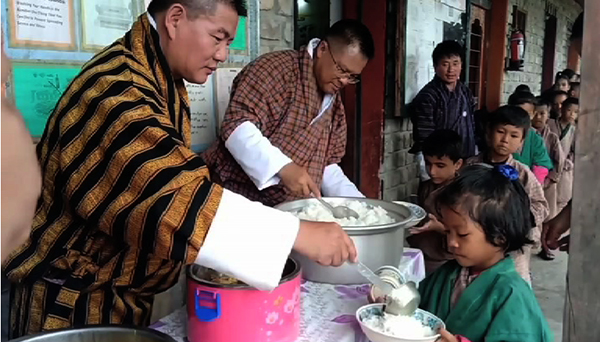 One of the beneficiaries of the school feeding programme is Jangsa Primary School, a remote school in Langchenphu Gewog, Samdrup Jongkhar. The school started its feeding programme yesterday. The move is believed to benefit both the students as well as the vegetable group of the village.
One of the beneficiaries of the school feeding programme is Jangsa Primary School, a remote school in Langchenphu Gewog, Samdrup Jongkhar. The school started its feeding programme yesterday. The move is believed to benefit both the students as well as the vegetable group of the village.
After a month-long summer break, students started their second term of schooling with a smile, this is because they don’t have to carry packed lunch any more. Supported by the Royal Government of Bhutan, students of Jangsa Primary School will get two meals in a day; breakfast and lunch under this programme. Jangsa Primary School has a total of 21 students and parents say with the feeding programme in place, their children will now get hygienic and nutritious food.
“As farmers, we have to work all day and it’s sometimes challenging to wake up early to feed breakfast and prepare their lunch. Moreover, it’s quite a distance for our children to carry the packed lunch all the way. Now with the feeding programme, children will get time to study and they don’t have to carry packed lunch. They will get breakfast and freshly cooked lunch from the school,” said Tshering Lham, a parent.
“It was difficult for us to prepare lunch in the early morning and we sometimes don’t get any vegetables to make lunch for our children. Now with the feeding programme, we are very grateful and I think it will be nutritious in school,” added Nagay Dema, also a parent.
With Jangsa primary school, two other schools- Rekhey primary school and Pemathang lower secondary school are also provided with the feeding programme. However, without a proper kitchen and a dining hall, maintaining hygiene would be a challenge. The chief dzongkhag education officer says they have Nu 2 M to construct kitchen and store in Jangsa and Rekhey primary school but no budget to construct dining hall.
“Government is yet to approve Pemathang Lower Secondary School as primary central school and currently they are using temporary kitchen and dining hall. From next year Pemathang lower secondary school will get a kitchen as well as a dining hall. Regarding the dining hall for Rekhey and Jangsa primary school, we are hoping that the gewog administration will construct it next year,” said Rinchen Gyeltshen, the chief dzongkhag education officer for Samdrup Jongkhar.
With the start of the feeding programme in Jangsa primary school, the vegetable group in the chiwog also sees some opportunities to grow varieties of vegetables and earn some income.
“Without a proper market, we are not able to progress well. Now we can grow more vegetables and sell it here. It will be good for children to get organic vegetables,” Ram Lal Kafley, member of the Jangsa chiwog vegetable group, said.
For 380 students of these three schools, the government is spending about Nu 2.5 M in 10 months for procuring rations. The government provides a stipend of Nu 670 for each student every month.










